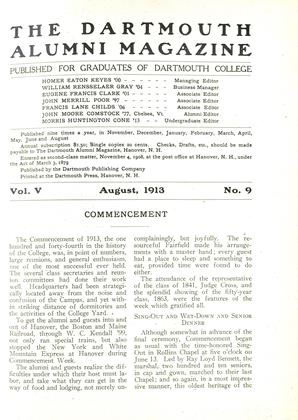In a review similar to this, published a year ago in the ALUMNI MAGAZINE, it was suggested that in emerging from a period of experimental development, the Tuck School had become conscious of the limitations of earlier perspective and had gained a view of the larger possibilities and demands in business education. The significance of the suggestion is partly to be found in the recent action of the Trustees, by which important appointments to the teaching staff provide additional strength not only for maintaining standards of individual instruction, but for undertaking work of enlarged scope and of more intensive quality.
Provision has been made especially for extending the courses in Business Organization and Management, a field heretofore occupying an important place in the curriculum, but conducted by one man working under the double restraint of divided time and limited facilities.
Thorough investigation of the principles of Scientific Management, supported by observations of the far-reaching results of their application to various phases of .industrial operations, seems to justify, even to compel, the school's determination further to develop instruction in this field. Accordingly, by virtue of the new plans, Director Person is relieved of courses in Commerce and Industry, and is thereby enabled to devote himself more largely to investigation and instruction in Scientific Management.
Mr. Henry Wood Shelton, Yale '04, appointed Assistant Professor of Business Organization and Management, will cooperate with Professor Person in conducting the enlarged group of courses pertaining to Scientific Management. By this arrangement, the School is enabled to broaden the scope of instruction and to introduce advanced methods of laboratory and field study adapted to the needs of individual students.
Professor Shelton brings to his Tuck School work a business experience of which a considerable period has been devoted to the development of Scientific 'Management under leading exponents of the Taylor System.
The first-year courses in Statistics will be followed by a new course, Advanced Business Statistics, offered by Professor Person to second-year students who specialize in this increasingly important function of administrative control.
Courses in Commerce will be conducted by Mr. Alfred Leslie Smith, a graduate of the College in 1912, of the Tuck School in 1913, and recently appointed Instructor in Commerce.
Mr. Smith will also offer a new second-year course for men desiring a special preparation for executive service in chambers of commerce, and similar trade organization. The course is to be given in combination with other selected bourses, to the end that a thorough training may be made available for this relatively new, but important and attractive vocation. It is believed that the innovation will prove timelv, for the School has frequently been requested to recommend men for such work, the successful records of graduates already engaged as commercial executives having reflected favorable attention to the Tuck School. Commercial executives and business men, moreover, have encouraged the undertaking and have generously offered their cooperation to its development.
As a representative of the Tuck School, Mr. Smith is a member of the party organized by the Boston Chamber of Commerce to tour South America. Upon his return, he will spend several months in visiting and studying the methods and organization of chambers of commerce.
By the appointment of Mr. Chester Arthur Phillips, formerly instructor in the Department rJc Economics, to an assistant professorship of Banking Practice the School is enabled to offer an additional second-year course. This provides a well-rounded group of courses ranging in content from the theory of money and banking to the more technical aspects of bank management and foreign exchange.
Professor Dixon will next year resume his active connection with the School and will offer an advanced course in Railway Statistics.
Owing to growing .demands of his position as Assistant Counsel of the Investment Bankers' Association, Professor Lyon relinquishes the courses in Banking now assumed by Professor Phillips, but will continue the arrangement by which, on part time, he conducts the courses in Corporation Finance and Commercial Law.
The School began the year with the same enrolment as that of the previous year. A class of eleven men completed the work of the Second Year and in April received the Master's degree. The positions available offered a wide range of opportunities for immediate employment. Two of the men entered the traffic department of a railroad, two are in manufacturing concerns, and the others, all in bottom-of-the-ladder capacities, are engaged respectively in real estate, insurance, publishing, advertising, banking, teaching, and public utilities management.
The prospect of first- and second-year classes, each larger than in any previous year, is met by a larger faculty, organized more effectively for administering a more thorough, comprehensive, and well-balanced curriculum.
 View Full Issue
View Full Issue
More From This Issue
-
 Article
ArticleCOMMENCEMENT
August 1913 -
 Article
ArticleTHE STATE OF DARTMOUTH COLLEGE
August 1913 -
 Sports
SportsATHLETICS AT DARTMOUTH
August 1913 By Charles Ernest Bolser -
 Article
ArticleTHAYER SCHOOL OF CIVIL ENGINEERING
August 1913 By Robert Fletcher, Director -
 Class Notes
Class NotesCLASS OF 1878
August 1913 By William D. Parkinson,, WM. D. PARKINSON, -
 Class Notes
Class NotesCLASS OF 1908
August 1913 By Lawrence M. Symmes,, LAURENCE M. SYMMES,








